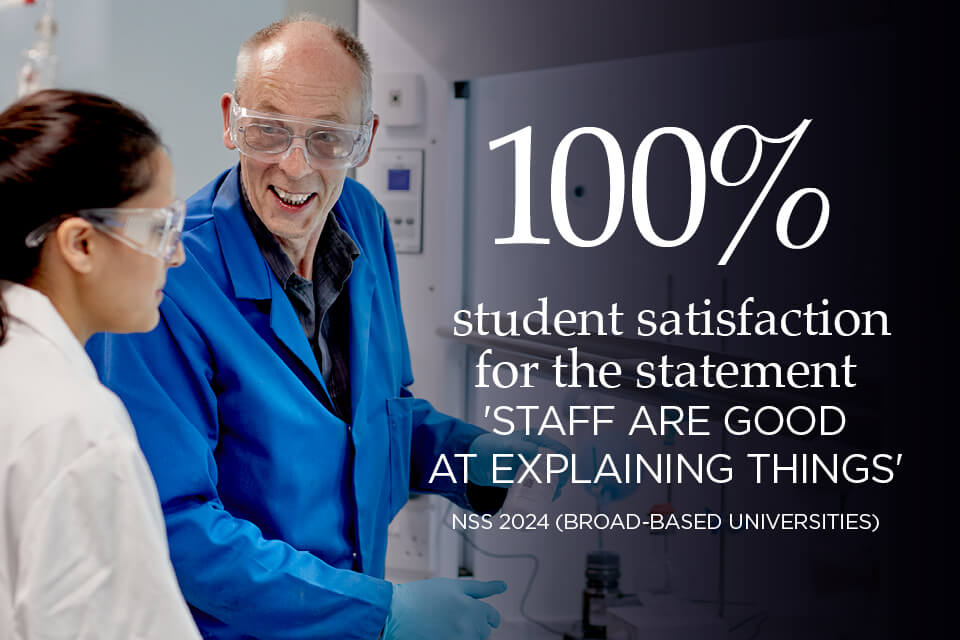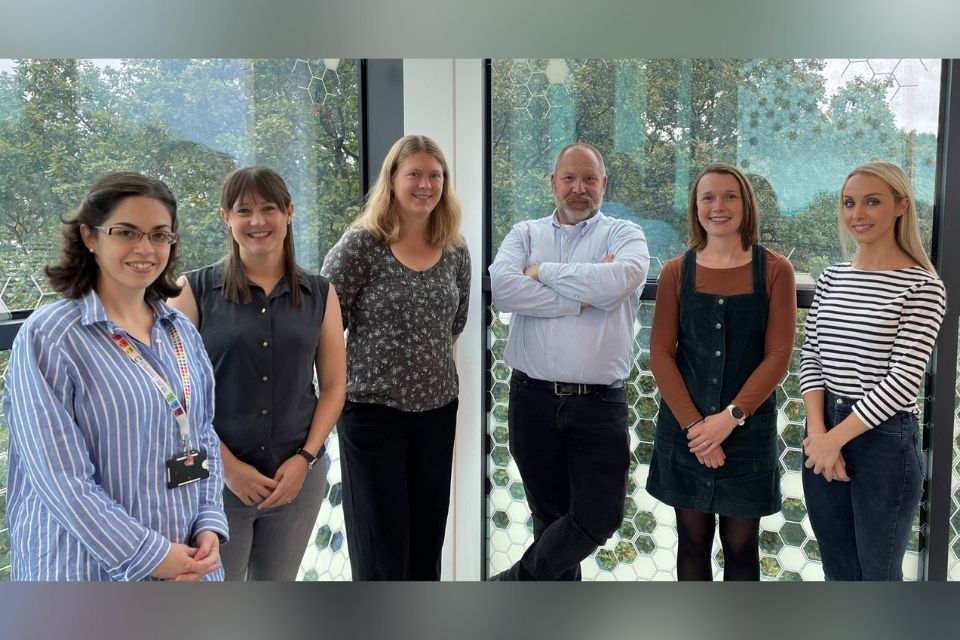
Year of entry
- 2026
UCAS code
- F108
Duration of study
- 4 years or 5 years with international or placement year
Chemistry with Materials Chemistry with Integrated Master's - MChem
Course summary
Could you develop new materials needed in our move towards a completely renewable energy society? Combining the principles of chemistry with the advanced study of materials and their practical applications in tackling global challenges, our Chemistry with Materials Chemistry with Integrated Master's MChem, will equip you with the advanced analytical techniques, data fluency, chemical design, applied problem solving and employability skills to pursue a research career as a professional materials chemist, or further your studies with a PhD.
Why study Chemistry with Materials Chemistry with Integrated Master's at Keele University?
Student satisfaction

Double Gold in the Teaching Excellence Framework
Keele is one of only 15 broad-based universities in England - out of over 100 - to have been awarded Gold in both the 2017 and 2023 Teaching Excellence Framework (TEF) exercises, demonstrating our consistent teaching excellence.

Additional opportunities
There are a range of additional opportunities for this course.
Please note that undertaking one may impact the availability of another.
Work placements
In an increasingly competitive job market, employers are seeking to recruit employees who have high-level knowledge, skills and an understanding of the workplace. In between year two and three of your studies, there is the opportunity to undertake a placement, gaining valuable practical experience with a chemistry-focused company or organisation. This will enable you to apply the skills and theories you have learnt to real situations in the industrial workplace, and enhance your employability.
If you don't think you can commit to a full year on placement, our Flexible Work Placement module has built-in flexibility on when and how you complete your placement, enabling you to balance your time in industry around existing demands.
We also offer work placements based in schools and colleges, specifically for students interested in entering the teaching profession.
Throughout your placement you will be supported by an academic advisor and a placements and project manager, who is based in the School of Chemical and Physical Sciences.
International year
This exciting opportunity enables you to experience education from different cultural perspectives and to establish international networks. It also shows you have the personal attributes to embrace new experiences which can enhance your employability. We offer exchange opportunities with a wide variety of partner institutions, in between year two and year three of your degree. .
Chemical Sciences Seminar Series
From your second year you will be invited to attend our Chemical Sciences Seminar Series, featuring speakers from academia and industry presenting material at the forefront of current scientific knowledge. This will provide you with invaluable insights into the latest research, trends and advancements from experts actively involved in their fields. It will also enable you to gain insight into job market trends and build valuable connections that may help you with future career pursuits.
Entry requirements
These are the typical entry requirements for this course for a range of UK and international qualifications. If your qualifications aren't listed, please contact us to check if we can accept them. If you don't think you'll meet the stated requirements, you may be able to access this course via a Foundation Year.
Typical offer
Please ensure you read the full entry requirements by selecting your qualifications from the menu below. This will include any subject specific, GCSE/Level 2 Maths, and/or English language requirements.
Please select your qualification from the drop-down list below for the full entry requirement information
A Level
BBC in three A levels including C in Chemistry
Contextual Offer: CCC in three A levels including C in Chemistry
You will also need: 4 / C in GCSE Maths or Level 2 Functional Skills Maths, plus an English language qualification (see below)
BTEC Extended Diploma / National Extended Diploma
DMM in any of the following BTEC Extended Diplomas / National Extended Diplomas:
Applied Science, including completion of three out of four of the following units: Applications of Organic Chemistry, Applications of Inorganic Chemistry, Industrial Chemical Analysis, Practical Chemical Analysis
Contextual Offer: MMM in any of the following BTEC Extended Diplomas / National Extended Diplomas:
Applied Science, including completion of three out of four of the following units: Applications of Organic Chemistry, Applications of Inorganic Chemistry, Industrial Chemical Analysis, Practical Chemical Analysis
You will also need: 4 / C in GCSE Maths or Level 2 Functional Skills Maths, plus an English language qualification (see below)
BTEC National Diploma / Diploma
Distinction and Merit in any BTEC National Diploma / Diploma and C in Chemistry A level, or Distinction and Merit in Applied Science BTEC National Diploma / Diploma including completion of three out of four of the following units: Applications of Organic Chemistry, Applications of Inorganic Chemistry, Industrial Chemical Analysis, Practical Chemical Analysis, and C in any A level
You will also need: 4 / C in GCSE Maths or Level 2 Functional Skills Maths, plus an English language qualification (see below)
BTEC National Extended Certificate / Subsidiary Diploma
Distinction in any BTEC National Extended Certificate / Subsidiary Diploma and CC in two A Levels including C in Chemistry.
You will also need: 4 / C in GCSE Maths or Level 2 Functional Skills Maths, plus an English language qualification (see below)
T Level
Merit in any of the following T Levels: Science, with specialism in Laboratory Sciences.
You will also need: 4 / C in GCSE Maths or Level 2 Functional Skills Maths, plus an English language qualification (see below)
International Baccalaureate Diploma
554 in three Higher Levels including 4 in Chemistry, or 29 points including 4 in Higher Level Chemistry
Contextual Offer: 543 in three Higher Levels including 4 in Chemistry, or 27 points including 4 in Higher Level Chemistry
You will also need: 4 / C in GCSE Maths or Level 2 Functional Skills Maths, or 3 in IB Middle Years Maths, or 3 in IB Diploma Standard Level Maths (any), plus an English language qualification (see below)
International Baccalaureate Career-Related Programme
We encourage applications with the IBCP but recognise that your combination of qualifications may differ depending on where you are studying.
If you are taking a BTEC National Diploma / Diploma with one or more Higher Levels, your offer will be similar to our BTEC + A Level offer (see 'BTEC National Diploma / Diploma') but with an HL requirement of 6 for A, 5 for B, or 4 for C.
For any other combination, please contact the University Admissions Team for advice.
Access to HE Diploma
112 UCAS points in an Access to HE Diploma with Chemistry related content, including Distinction in at least 15 Level 3 credits. Please contact the University Admissions Team for advice on whether your chosen course would qualify.
You will also need: 4 / C in GCSE Maths or Level 2 Functional Skills Maths, plus an English language qualification (see below)
Welsh Baccalaureate / Bagloriaeth Cymru
The Advanced Skills Challenge Certificate is equivalent to one full A Level at the same grade and can be included alongside 2 other A Levels in a standard A Level offer for this course (see A Level). All subject specific requirements will still need to be met.
Scotland - Highers and Advanced Highers
BCCCC in five Highers including Chemistry Higher, or CD in two Advanced Highers and CC in two Highers including Chemistry Higher or Advanced Higher, or CCD in three Advanced Highers including Chemistry Advanced Higher.
You will also need: C in National 5 Maths, or 4 / C in GCSE Maths or Level 2 Functional Skills Maths, plus an English language qualification (see below)
Extended Project Qualification (EPQ)
If you have B or higher in the EPQ and are studying A Levels, BTEC, the International Baccalaureate Diploma, or an Access to HE Diploma, you will typically receive an alternative offer which will be lower than the standard offer. Please see 'Alternative and contextual offers' below.
Core Maths
If you have B or higher in Core Maths and are studying A Levels, BTEC, the International Baccalaureate, or an Access to HE Diploma, you will typically receive an alternative offer which will be lower than the standard offer. Please see 'Alternative and contextual offers' below.
Ireland - Leaving Certificate
H3, H4, H4, H4, H4, H4 in the Irish Leaving Certificate including H4 in Chemistry or Physics and Chemistry (combined).
You will also need: O4 / H6 in Maths, plus an English language qualification (see below)
China - Gaokao
70% in the Gaokao including 70% in Chemistry.
You will also need: 60% in Senior Secondary School or Gaokao Maths, plus an English language qualification (see below)
India - Standard XII
Average of 65% from four subjects including 70% in Chemistry in the ICSE, CBSE or Western Bengal Standard XII, or average of 70% from four subjects including 75% in Chemistry in any other Standard XII.
You will also need: 6 or C2 in Secondary School Examination Maths, or Pass in Standard XII Maths, plus an English language qualification (see below)
Germany - Abitur
2.4 overall average in the Abitur including 12 in Chemistry.
You will also need: 10 in Maths in the Abitur, plus an English language qualification (see below)
France - Baccalaureate
12 in the French Baccalaureate / International Option Baccalaureate including 13 in Chemistry / Physics, or 12 in the Baccalauréat Français International including 12 in Chemistry / Physics.
You will also need: 10 in Maths in the Baccalaureate, plus an English language qualification (see below).
Hong Kong - Diploma
443 from two electives and one core subject in the HKDSE including 4 in Chemistry.
You will also need: 2 in HKDSE Maths, plus an English language qualification (see below)
Spain - Bachillerato
Overall average of 7 in the Título de Bachillerato including 8 in Chemistry.
You will also need: 5 in Graduado en Educación Secundaria (GES) Maths or 6 in Título de Bachiller Maths, plus an English language qualification (see below)
Italy - Diploma di Esame di Stato
75% in the Esame di Stato including 8 in Chemistry.
You will also need: 5 in Maths in the Diploma, plus an English language qualification (see below)
Cyprus - Apolytirion
17.5 / 83% in the Apolytirion including 18 in Chemistry.
You will also need: 14 in Maths in the Apolytirion, plus an English language qualification (see below)
Portugal
Overall average of 15 in a Secondary Certificate including 16 in Chemistry.
You will also need: 10 in Secondary Certificate Maths, plus an English language qualification (see below)
Canada - Diploma
60% / BCCCC in five courses in the Grade 12 Diploma including 70% in Chemistry.
You will also need: 50% in Grade 11 Maths, plus an English language qualification (see below)
Kenya - KCSE / Diploma
We do not accept the Kenya Certificate of Secondary Education for direct entry. However, you can apply to study an International Foundation Year at Keele University International College. On successful completion, you can progress to an undergraduate degree at Keele.
We may accept a two year Diploma. Please contact the University Admissions Team for advice.
Nigeria - Senior School Certificate / OND
We do not accept the Senior School Certificate (WAEC or NECO) for direct entry. However, you can apply to study an International Foundation Year at Keele University International College. On successful completion, you can progress to an undergraduate degree at Keele.
We may accept an Ordinary National Diploma with GPA of 2.5 or a Merit / Lower Credit. Please contact the University Admissions Team for advice.
USA - Advanced Placement
443 from three Advanced Placement subjects including 4 in Chemistry.
You will also need: C in Grade 12 High School Diploma Maths, plus an English language qualification (see below)
Ghana
We do not accept the West African Senior School Certificate Examination for direct entry. However, you can apply to study an International Foundation Year at Keele University International College. On successful completion, you can progress to an undergraduate degree at Keele.
Sri Lanka - Advanced Level
BBC in three Advanced Levels including C in Chemistry.
You will also need: C in O-level Maths, plus an English language qualification (see below)
Malaysia - STPM
BBC in three subjects in the STPM including C in Chemistry.
You will also need: C in SPM Maths, plus an English language qualification (see below)
Pakistan - Secondary School Certificate
We do not accept the Secondary School Certificate for direct entry. However, you can apply to study an International Foundation Year at Keele University International College. On successful completion, you can progress to an undergraduate degree at Keele.
Singapore - A Levels (H2)
BBC in three H2 Levels including C in Chemistry.
You will also need: C in O-level Maths, plus an English language qualification (see below)
European Baccalaureate
70% overall with 7 in Chemistry.
You will also need: 6 in European Baccalaureate Maths, plus an English language qualification (see below)
NCUK
Pass NCUK Foundation Year with BBC including C in Chemistry. Grade C in EAP English Language module
You will also need: 4 / C in GCSE Maths or international equivalent
Uganda - Advanced Certificate of Education
BBC in three Principal level subjects in the Advanced Certificate of Education including C in Chemistry
You will also need: 6 in UACE or UCE Maths, plus an English language qualification (see below)
Zimbabwe - Advanced Level GCE
BBC in three Advanced Level subjects including C in Chemistry
You will also need: 4 / C in GCSE Maths or Level 2 Functional Skills Maths, plus an English language qualification (see below)
English language requirements
All our courses require an English language qualification or test. Most students meet this through a 4 or C in GCSE English. Please visit our English Language pages for details, including test information for international students. For students who require a test, this course requires a result from Group A.
Alternative and contextual offers
We're committed to ensuring equality of opportunity for applicants with the potential and motivation to succeed, regardless of background. We offer alternative offer schemes with clear eligibility criteria, including contextual offers, offers for those studying in the Keele region, and recognition of a range of additional qualifications.
General information
The entry grades outlined indicate the typical offer, along with any subject specific requirements. This is for general information only. Keele University reserves the right to vary conditions based upon a candidate's application.
Social life, societies and sports
Find out moreAccommodation
Find out moreLocal area and travel
Find out moreBoost your employability
Find out moreFacilities
Develop your practical skills in Keele's state-of-the-art Central Science Laboratories
Central Science Laboratories
Practical teaching will take place in Keele’s state-of-the-art £34m Central Science Laboratories (CSL). You will have access to a wide variety and high volume of industry-standard equipment that is housed within a space designed to encourage and enable collaborative and interdisciplinary working. We continue to invest in high quality equipment and instrumentation to an industry standard. You will be trained how to use research level equipment from the first semester of your first year. This means that by the time you graduate you will have extensive experience in the use of the instrumentation that you may use in your career or research within the field.
Learn from inspiring and award-winning academics
A dynamic group of staff with a broad range of expertise teach on the programme and bring a wealth of experience acquired through fundamental and applied research across a diverse range of areas.
Many of our teaching staff are Fellows or Senior Fellows of the Higher Education Academy, the professional body for teachers in Higher Education. Fellowship provides individuals with recognition of their practice, impact and leadership of teaching and learning.
A number of our academic staff have also achieved national recognition for their excellence and innovation in teaching and hold awards from a variety of institutions, including the Royal Society of Chemistry and and AdvanceHE.
In testament to our teaching excellence, many of our teaching methods have been adopted by other chemistry departments in the UK and beyond.


"Chemistry at Keele offers the perfect microcosm to flourish. It cemented my love for science and has truly nurtured me into a critical and enthusiastic scientist. "

"The chemistry department are so wonderful and till this day they’re helping me in my career as an educator. I am especially grateful for introducing me to the wonders of team based learning, as I plan on implementing this in my career as a teacher."
Foundation year
Foundation year overview
Our Foundation Year provides an excellent alternative route to Keele, offering preparation for your chosen degree with guaranteed entry onto your undergraduate course once you successfully complete.
This extra year of study can improve your academic skills, expand your subject knowledge, build your confidence, and provide a better understanding of higher education.
On our Foundation Year, you'll join our undergraduate community from the outset, with access to all the facilities and support you'd get as an undergraduate student at Keele.
Student life at Keele is vibrant, diverse, and packed with opportunities to make the most of your time at university.
We help students manage their money and ensure that they receive any funding for which they may be eligible.
Make yourself more employable after graduation by taking advantage of the whole host of additional opportunities.






